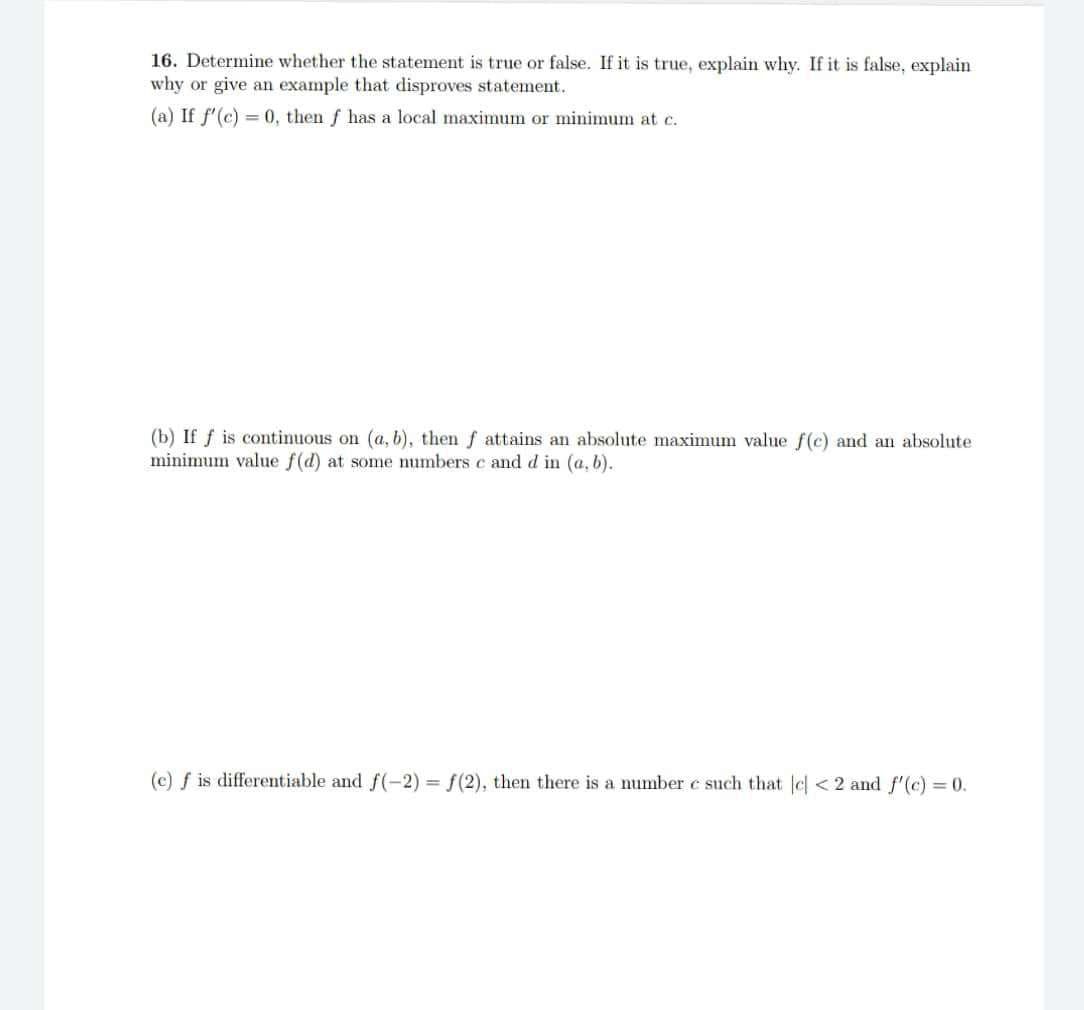16. Determine whether the statement is true or false. If it is true, explain why. If it is false, explain why or give an example that disproves statement. (a) If f'(c) = 0, then f has a local maximum or minimum at c. (b) If f is continuous on (a, b), then f attains an absolute maximum value f(c) and an absolute minimum value f(d) at some numbers c and d in (a, b). (c) f is differentiable and f(-2) = f(2), then there is a number c such that [c] <2 and f'(c) = 0.
16. Determine whether the statement is true or false. If it is true, explain why. If it is false, explain why or give an example that disproves statement. (a) If f'(c) = 0, then f has a local maximum or minimum at c. (b) If f is continuous on (a, b), then f attains an absolute maximum value f(c) and an absolute minimum value f(d) at some numbers c and d in (a, b). (c) f is differentiable and f(-2) = f(2), then there is a number c such that [c] <2 and f'(c) = 0.
College Algebra (MindTap Course List)
12th Edition
ISBN:9781305652231
Author:R. David Gustafson, Jeff Hughes
Publisher:R. David Gustafson, Jeff Hughes
Chapter3: Functions
Section3.3: More On Functions; Piecewise-defined Functions
Problem 99E: Determine if the statemment is true or false. If the statement is false, then correct it and make it...
Related questions
Question

Transcribed Image Text:16. Determine whether the statement is true or false. If it is true, explain why. If it is false, explain
why or give an example that disproves statement.
(a) If f'(c) = 0, then f has a local maximum or minimum at c.
(b) If f is continuous on (a, b), then f attains an absolute maximum value f(c) and an absolute
minimum value f(d) at me numbers c and d in (a, b).
(e) f is differentiable and f(-2) = f(2), then there is a number c such that cl < 2 and f'(c) = 0.
Expert Solution
This question has been solved!
Explore an expertly crafted, step-by-step solution for a thorough understanding of key concepts.
Step by step
Solved in 2 steps with 1 images

Recommended textbooks for you

College Algebra (MindTap Course List)
Algebra
ISBN:
9781305652231
Author:
R. David Gustafson, Jeff Hughes
Publisher:
Cengage Learning

Functions and Change: A Modeling Approach to Coll…
Algebra
ISBN:
9781337111348
Author:
Bruce Crauder, Benny Evans, Alan Noell
Publisher:
Cengage Learning


College Algebra (MindTap Course List)
Algebra
ISBN:
9781305652231
Author:
R. David Gustafson, Jeff Hughes
Publisher:
Cengage Learning

Functions and Change: A Modeling Approach to Coll…
Algebra
ISBN:
9781337111348
Author:
Bruce Crauder, Benny Evans, Alan Noell
Publisher:
Cengage Learning
